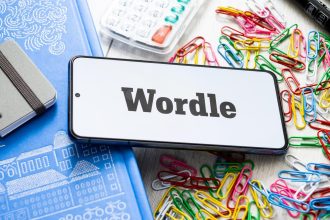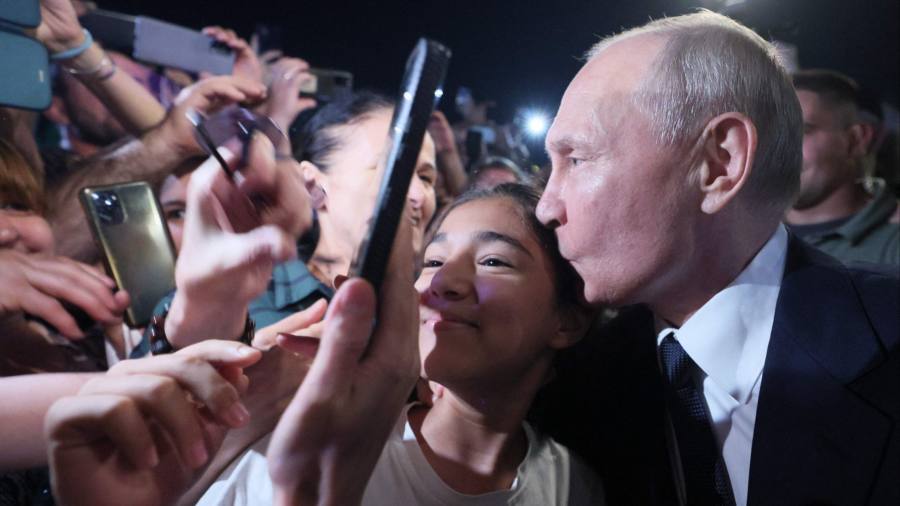Vladimir Putin kissed and took selfies with regular Russians this week, a startling image for the germaphobe president who often makes official guests sit at the other end of a long table and has been known to force ministers to quarantine for weeks before seeing him.
But after an armed uprising by the Wagner paramilitary group shook his authority, Putin has been keen to show he has public backing, even at the risk of contracting a virus.
Visiting the southern city of Derbent on Wednesday night, the Russian leader was filmed briefly meeting a large group of supporters — Putin’s first public walkabout since the start of the Covid-19 pandemic.
The Kremlin stressed that the president continued to be “subject to a special [epidemiological security]” but that he “could not refuse these people” who had allegedly come to show their support unprompted.
In the week since the Wagner Group’s mutiny, the Kremlin has sought to project a sense of normality, and Putin has engaged in activities pointedly unrelated to the attempted coup, such as visiting a start-up forum and holding a meeting about tourism. These were accompanied by a flurry of diplomacy with allies and, behind the scenes, the detention of a leading general.
Observers said Putin’s diary in the crucial aftermath of the insurrection reflected his need to repair his image in the eyes of Russia’s people and power brokers.
“Part of the Russian elite valued [Putin] as a strong emperor. A strong emperor shouldn’t allow these things to happen,” said Greg Yudin, professor of political philosophy at the Moscow School of Social and Economic Sciences. “I don’t think it’s over. And he is aware of that.”
While the mutiny appeared shortlived, Putin’s responses betrayed signs of weakness. On the morning of the uprising, Putin pledged to punish the “traitors” for their “stab in the back”. By the evening, he agreed to a truce with the head of the uprising, Wagner militia leader Yevgeny Prigozhin, allowing all to turn round and go home.
Two days later, with Prigozhin’s whereabouts still unclear, the Kremlin turned round once more, saying that treason charges were still standing, only to revert to the amnesty offer on Tuesday once the warlord was confirmed to have arrived in Belarus.
“The whole story demonstrated the fragility of the Russian state and of Putin’s leadership,” said Vladimir Gelman, a Russian political scientist at the University of Helsinki. The Kremlin publicising events such as the visit to Derbent was an attempt to “restore the previous status quo”, he said.
A crucial audience for Putin’s attempts to restore his standing is the Moscow elite, from the political class to the security services. Some members of this group may have aided, or at least known about and failed to prevent, the rebellion.
“As far as Putin is concerned, his main problem is that he allowed this, he didn’t prevent this,” said Oleg Ignatov, a senior Russia analyst with Crisis Group, a think-tank. To reassure the elite, he must “restore his image. He must show he can prevent such crises in the future”.
In public opinion polls, Putin’s standing domestically appears undiminished, though people may be careful about how they respond to pollsters considering the Kremlin’s crackdown on dissenters since the start of its full-scale invasion of Ukraine last year.
His ratings dipped slightly on Saturday, before quickly rebounding to where they were before the aborted revolt, according to the independent Russian pollster Levada.
“We saw a moderate increase of anxiety levels,” said Ekaterina Schulmann, a Russian political scientist. “People did notice what happened, even though it all was wrapped up very quickly.”
But images from Rostov, in which local residents cheered and welcomed the Wagner fighters that had briefly seized the city as part of the revolt, would have been watched closely in the Kremlin.
State television was quick to praise Putin as having successfully found a peaceful solution and prevented civil war. The message being hammered home was that the Russian people had shown “unity” in the face of the insurrection — an image the Derbent visit also sought to reinforce.
“They needed to show that Putin remains one with the people, that he still enjoys the public’s love,” Schulmann said. “This was supposed to override the images from Rostov.”
Putin’s rhetoric about the uprising quickly caught on, said Denis Volkov, head of the Levada Center. In his speeches, Putin stressed that Prigozhin had tried to create chaos and had threatened the stability of the state.
By contrast with Putin, the warlord, admired by some segments of the public for his straight talking, saw his popularity drop sharply: his favourability rating according to a Levada poll had halved immediately after the insurrection.
“The Kremlin explained that, where you thought Prigozhin was a patriot, he was actually a traitor, and where you thought he was a fighter against corruption, he was actually a thief,” Volkov said.
In addition to attempts at restoring Putin’s image at home, the Kremlin has worked the phones and sent emissaries to shore up support among allies abroad.
This week, Putin has held phone calls with the leaders of Arab nations, Iran and India, while his deputy foreign minister Sergei Vershinin flew to Damascus just two days after the riot to meet Bashar al-Assad, whose regime has long relied on Russian military support.
The failed mutiny managed to “create a crack” in the widespread attitude of resignation among Russians who believe that “whatever [Putin] wants he always gets, and whatever he does he always gets away with it”, Yudin said.
But Putin’s meeting with the public was rather aimed at members of the elite, whose recent public statements may not have shown complete loyalty and support for the president, Volkov said.
“They needed to send the elite a message: ‘Perhaps you want to think again before you speak. The people are behind me’.”
Read the full article here




